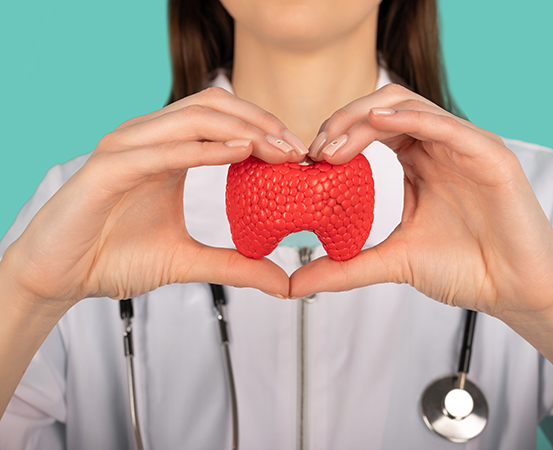
If you fatigue easily, are slow to do chores, are constipated, experience muscle weakness, depression, or even feeling overactive and gaining or losing weight a bit too rapidly, it could be more than just a bad phase you are going through. More than often, it could also be an overactive or underactive thyroid gland at work.
This butterfly-shaped gland, located at the front of the neck releases two hormones, triiodothyronine (T3) and thyroxine (T4), that help control various functions in the body such as metabolism, muscle control and mood. It has an important job to do within the body — releasing and controlling thyroid hormones that control metabolism.
What is thyroid disease
When the thyroid does not work properly, it can impact the entire body. Though earlier it was thought that it was mostly women who suffered from thyroid issues, now, however, experts say that it is quite common for men too, to experience thyroid dysfunction.
Common thyroid problems can mean an abnormal production of thyroid hormones. Too much of it can result in a condition known as hyperthyroidism and too less of hormone production leads to hypothyroidism.
One may be at a higher risk of developing a thyroid disease if there is a family history, has a medical condition, is taking medications high in iodine or has had treatment for a past thyroid condition or cancer. Though it may cause discomfort, most thyroid problems can be managed well if accurately diagnosed and treated.
Hypo and hyperthyroidism
With increasing age, it becomes even more important to get tested and check thyroid levels. Both hypothyroidism and hyperthyroidism can have debilitating effects if not checked and treated early. There are quite a lot of symptoms that one may experience if one has thyroid disease but since they are remarkably similar to other medical conditions, it is important to get tested specifically to check thyroid function.
“Hypothyroidism results in weight gain, fatigue, lassitude, sexual dysfunction and body ache,” says Dr Chandar Mohan Batra, endocrinologist, Apollo Hospitals, Delhi.
According to Dr (Prof) Subhash K Wangnoo, senior consultant endocrinologist at Apollo Hospitals, Delhi, hypothyroidism can also cause symptoms like dry skin, alopecia, cold intolerance, constipation and poor memory.
Hyperthyroidism on the other hand can cause weight loss and increased heart rate. Fatigue, anxiety and tremors could be the other symptoms, apart from warm and moist skin, heat intolerance, weight loss, diarrhoea and palpitations.
“Hypothyroidism is much more common than hyperthyroidism, but both are less common in men compared to women. In hypothyroidism, the thyroid gland is underactive and does not produce enough thyroid hormone. Hyperthyroidism is because of overactive thyroid glands. But it must be distinguished from the inflamed gland, leaking hormones – which is called thyroiditis,” says Dr Karthik, consultant endocrinologist, Sri Ramachandra Medical Centre, Chennai.
When your thyroid malfunctions, it can also affect sexual health and pleasure and therefore thyroid disorders often are associated with sexual dysfunction issues in both men and women. Both hypothyroidism and hyperthyroidism have been linked to erectile dysfunction (ED) for men, painful intercourse for women, and low libido for both genders, among other problems.
Thyroid tests and treatment
“Consuming iodised salt, maintaining normal weight and consulting a doctor early when symptoms arise are things patients can do as a preventive measure,” says Dr Karthik.
Usually, if your doctor thinks you have a thyroid problem, your medical history and symptoms will be checked, a physical exam conducted and some routine blood tests to check thyroid hormone levels. Some imaging tests are also recommended, to look for thyroid dysfunction such as goitres and thyroid enlargement (hyperplasia). Depending on whether you are suffering from hypo or hyperthyroidism, your treatment will start.
If hyperthyroidism is suspected, you may also have imaging tests such as a radioactive iodine uptake (RAI-U) test, an ultrasound, computed tomography (CT) and magnetic resonance imaging (MRI). “Treatment is to decrease the excessive thyroid hormones by drugs, radioiodine or surgery of the thyroid gland,” says Dr Batra.
If hypothyroidism is suspected, your healthcare provider may order an ultrasound, but it is unlikely you’ll need any other imaging tests unless he or she thinks the hypothyroidism is due to a pituitary or brain issue known as central hypothyroidism. “Hypothyroidism once diagnosed is easily managed by thyroid hormone supplementation,” points out Dr Wangnoo. “Treatment is to replace thyroxine orally in tablet form,” says Dr Batra.
Other than taking thyroid disease treatment, lifestyle changes, if incorporated, can help you combat it, says diabetologist, Dr Manoj Lokhande of Lokhande’s Clinic in Kalyan West, Mumbai. “Since both hypo and hyperthyroidism can affect the heart, increase the risk of diabetes, and affect the sexual drive in men and women, lifestyle changes can improve the functioning of your immune system. Eat a lot of fruits and vegetables, a balanced diet is a must. Exercise regularly, walk, do yoga and make sure these activities are part of your life.”
To maintain a healthy thyroid, it is also important to minimise exposure to things that can interfere with one’s endocrine health. Many chemicals may interfere with the body’s endocrine system. Endocrine disruptors are everywhere. They may be through food and beverages consumed, plastic bottles and containers, liners of metal food cans, detergents, flame retardants, food, toys, cosmetics and pesticides. As per the National Institute of Environmental Health Sciences, contact with these chemicals may occur through diet, air, skin and water.
One may ask how long after thyroid medications would a person feel better. This is usually a personal experience that varies from person to person and depends on issues like the prescribed dose, the time, other medical conditions and overall health.
Also on whether thyroid issues are only treatable or curable, the American Thyroid Association says that the most important aspect of thyroid disease is that that there are a lot of treatments that work well to restore thyroid function to normal. The underlying cause of the disorder is not ‘cured’ and once diagnosed, the individuals need lifelong medical follow-up.
















